Believe it or not, in March and April, while Los Angeles has just entered springtime, Thailand is in the midst and mist of summer. April is the hottest month in Thailand—and it’s already hot year round–and mid-April there is a Thai New Year festival called Songkran. The traditional throwing of water at people seems to be a delightful celebration in the 100ºF (38ºC) with full 90% humidity climate.
There are a few dishes that I remember are only served around the Songkran festival. One of them is the noodle dish called “Kanon Jeen Sao Nam”. It’s a soft rice noodle, “kanom jeen”, served with sweet and sour chopped pineapple, sliced fresh garlic, thinly julienned young ginger, ground dried shrimp, semi-hard boiled egg, coconut milk and fish balls, or “jang-lon”.
I know this combination of ingredients sounds weird even to some Thais. I have a friend, a Thai-Chinese, who even though she grew up in Bangkok where the dish is originated, she never once came across the dish. But that thought will only last until you taste the first bite of kanom jeen sao nam because you will be hooked for life. It’s so refreshing and delicious, especially in the hot climate.
The key to this dish is the “freshness” of the ingredients. I only make it when fresh pineapple is in season because I refuse to use canned pineapple (and you should too). I don’t even want to use canned coconut milk, though I have to. If I could get the frozen shredded coconut, I would squeeze my own coconut milk. The aroma of fresh-squeezed coconut milk and fresh pineapple combined with ginger, garlic and dried shrimp, reminds me of Songkran and the memories of the splash of cold water mixed with fragrant clay on my skin in the midst of summer.
“Kanom Jeen” is an ingredient that is very hard to come by. So, I’m using the boiled dried Vietnamese rice noodle to substitute. Someday, when I’ve got the right tools, I will be making my own kanom jeen.
“Jang Lon” is a type of fish balls that normally are made at home with ground mackerel or ground featherback fish, pounded down until it’s sticky and smooth just like when you make Todd Mun (yes if you pound fish meat long enough, it will become sticky and smooth). Some spices can be added: chili, garlic, coriander root, white pepper, turmeric and many more. It’s very different in each household.
The smooth fish meat would then be formed into a ball and roasted until cooked. My grandmother’s original recipe used mackerel fish pounded with salt, pepper and very little turmeric, that’s it. Since mackerel fish isn’t available, I’m going to use just regular frozen fish balls made with 100% fish meat from the market to substitute. Be careful, some fish balls might contain starch, and that’s not going to be acceptable with this dish.
Ingredients: (for 2 servings)
NOTE: These are approximate amounts, but with each ingredient you can use as little or as much as you like. There is nothing wrong with it.
Fish balls sliced about 1/4” thick, about 1 cup
Coconut milk 2 cups
Pineapple chopped or cut into small pieces
Very thin julienned ginger 1/2 cup
Very thin sliced fresh garlic 1/4 cup
Ground dried shrimp 1/4 cup (You have to buy it)
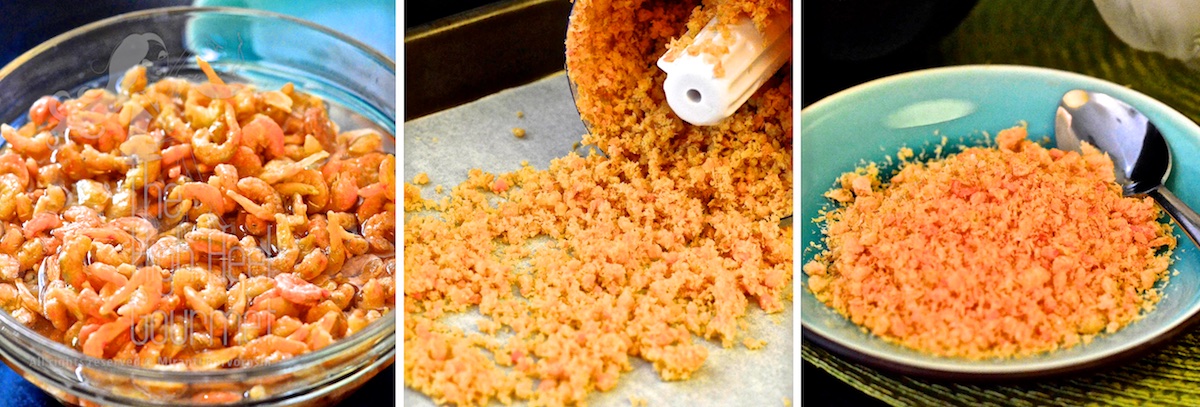
Soak the shrimps until soft, drain the water and let them dry a little before grinding. The good ground dried shrimp should be “fluffy” not grainy like mine. I didn’t soak them enough and didn’t let them dry long enough.
2 Soft boiled eggs cut in half
Fish sauce 1/4 cup
Lime cut in wedges 1 lime
Granulated sugar 1/4 cup
Chopped Bird’s Eye Chilli (optional)
Dried rice noodles about a fistful, around 6-8 oz dry weight (choose the type that has round cross-section like spaghetti, not the rectangular cross-section like linguini)
Method:
1) Boil the noodles: set the a pot of water over the stove, put the heat on high, wait until the water comes to a full boil before putting the noodles in, then cook them until they are soft. We don’t do al dente with these rice noodles. (They will give you gas.)
Once they are fully cooked, rinse them in cold water until they are completely cold, drain the water and quickly wrap them around your fingers or group them together in bunches while they are still wet because once they get dry, they will stick together. I like to roll them around my four fingers, about a bite size, so they are easy to eat.
2) Make the jang-lon sauce: set another pot over medium high heat. If you are using canned coconut milk add it in to the pot, wait until it boils and drop the sliced fish balls in there. You will know when the fish balls are cooked by seeing them float up to the surface. Turn off the stove. Another way to cook the fish balls is to grill them, but I don’t have a charcoal grill at this time.
If you are using fresh squeezed coconut milk, use the thin part to boil the fish balls. Normally you will get the coconut milk by soaking the shredded coconut with warm water then squeezing it through a strainer. You will get a very thick coconut milk in the first round. Repeat the process again with the same shredded coconut, because there is still some milk left.
The second round milk will be thinner. Combine the milk and let it sit for 10-15 minutes, until the cream and the water separate, skim the cream part, set it aside and use the by-product part to boil the fish balls. Once the fish balls are all cooked, discard the thin coconut milk and boil the cream part over medium heat until it starts to bubble, then turn off the heat right away. Do not let the milk boil over or the oil will start to separate, and we don’t want that. Then you put the fish balls in the coconut milk.
3) Assemble: at my house in Bangkok, the cook would put all the rest of the ingredients in a separate bowl so everyone can assemble their own dish, but I can’t do that at my house here because my big boy, farang husband would not know what to do, so I put them in the plate for him.
Put the noodles in first then add chopped pineapple on top of the noodles, add ginger, garlic and ground dried shrimp, put sugar, lime wedge and chili on the side, pour fish sauce over then add the jang-lon sauce. Mix them well and squeeze the lime on them before you eat. Enjoy!

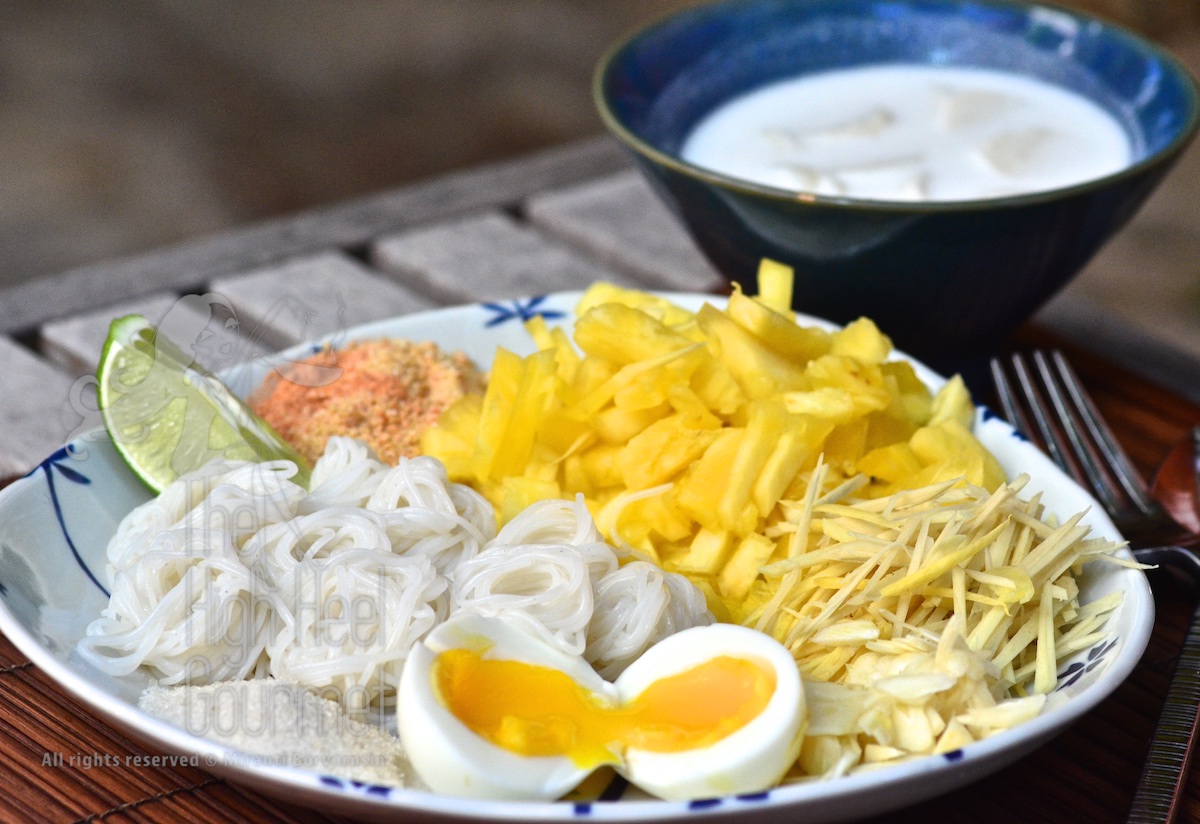
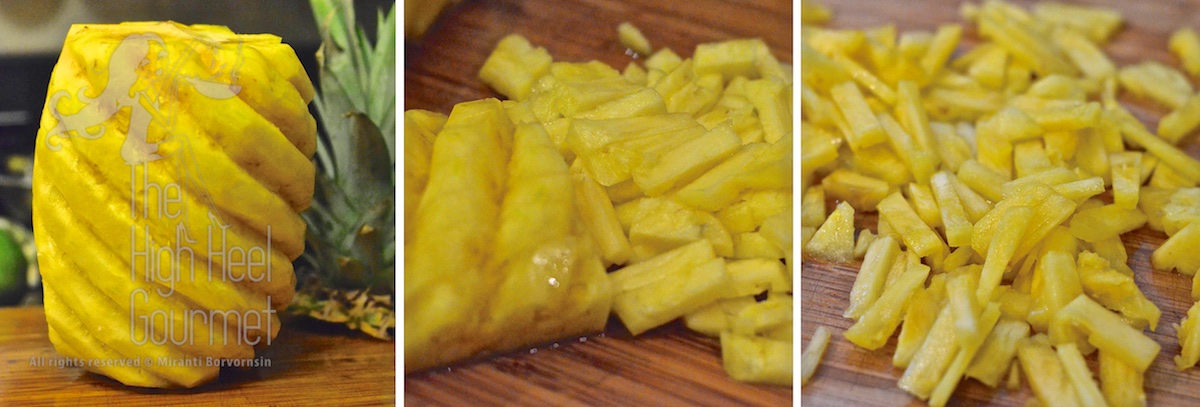
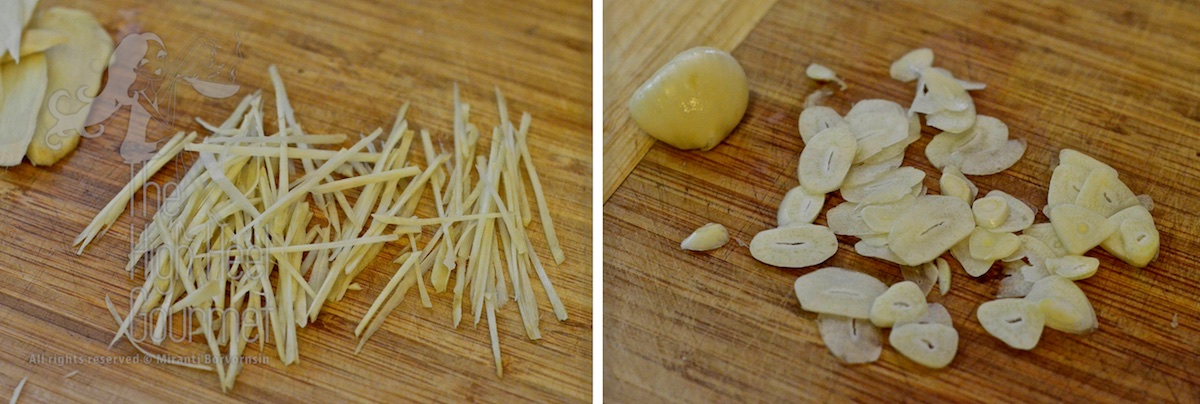
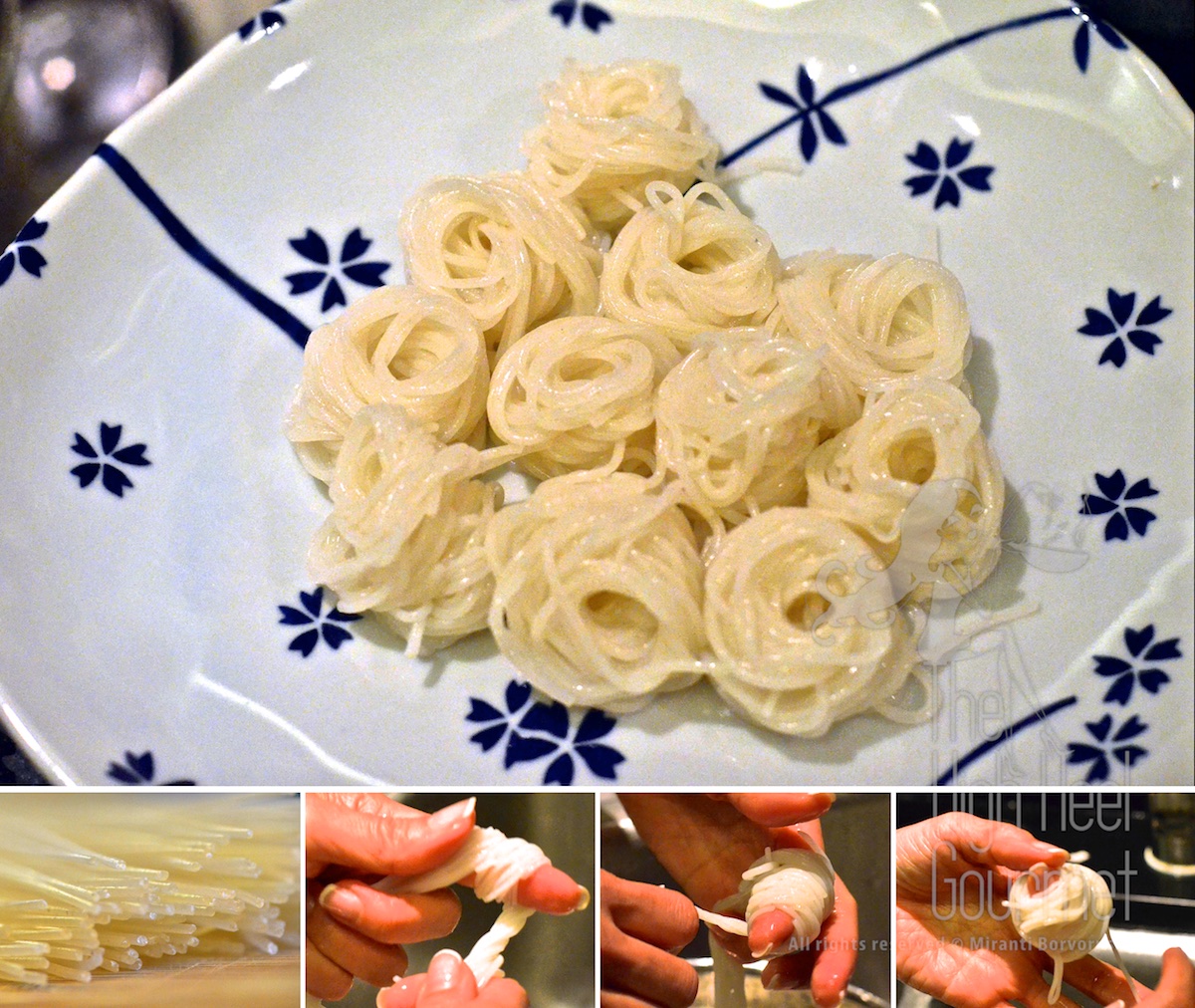
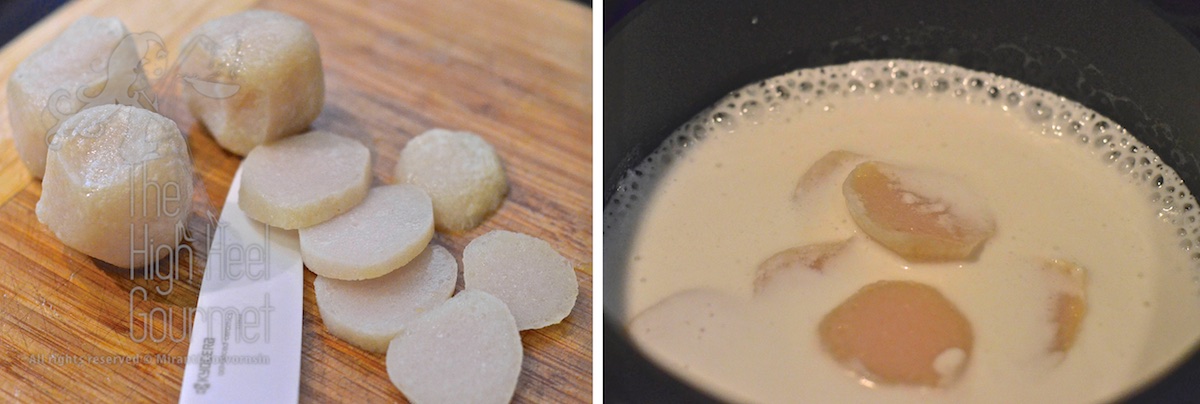
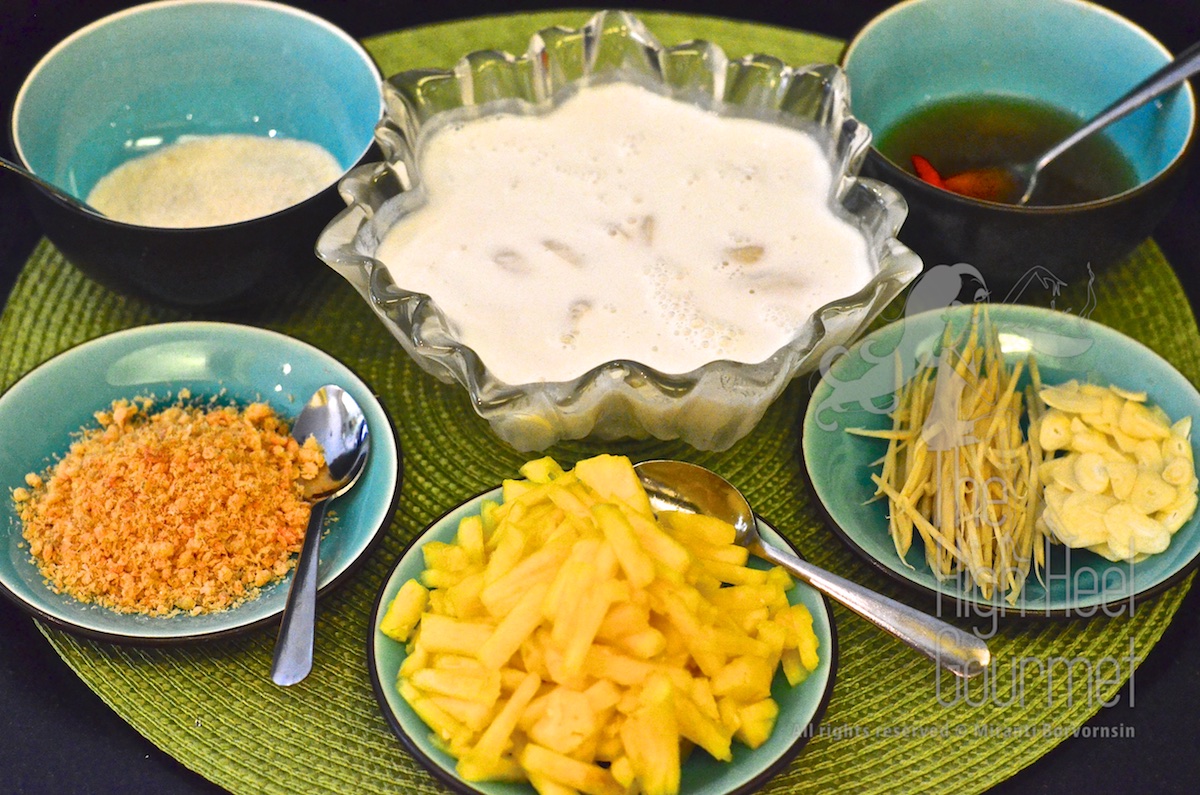

just found ur site ka… wanna eat the boiled egg ! hahaha
lol…Yes, Miss Beansprout. Am I going to see you in Bangkok? Let’s go to Mumu’s new restaurant/bakery together. I will send my phone number to you on FB.